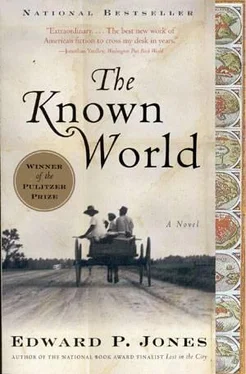Toward the end of his second week on the Townsend plantation, Elias became ill, suffering headaches that hammered him senseless. He could not keep food in his stomach, and there were unaccountable blisters on the soles of his feet. At times, he had to lean over in a furrow to collect himself, as some rush of pain overwhelmed and seemed to want to tear him apart right where he stood. He knew that in order to slip away one night he had to be seen as reliable, but his work suffered with his sickness and Moses also took to calling him a lazy man. “You mighta bought a pig in a poke, Master,” he told Henry one day. Elias would wake in the night and hear the wind counting off the days he had to live. “Better play. Better play,” the wind told him, “cause ain’t no more after today.”
He had never been one to believe in root work, but he began to feel that Celeste was doing something to him and that it would lead to his death, a long way from freedom. He dreamed she had gotten her limp by wrestling with the devil. But she wasn’t one for root work, and because she was the kind of woman she was, her resentment against him had actually dissipated after the third week. To her he had become just another man who couldn’t stand to be around a cripple woman. By the fourth week, she would see him bent over in a furrow and feel sorry for him.
Then, toward the middle of the fifth week, he began to improve and the wind stopped talking to him. He had been weakened by the illness, however, and tried to restore himself by working harder and longer in the fields, often staying there long after Moses told him he was finished for the day. But even by the ninth and tenth weeks his body was not what it had been, and by the fourth month, he began to despair. He continued planning to run away, but he worried that he might not have the strength to run for miles, might not be able to turn and break the necks of any dogs chasing him.
In his fourth month there, he got up off his pallet about midnight and walked away, following the stars that pointed north. This was in the time when Sheriff John Skiffington’s patrollers were getting used to their new jobs. Elias got about five miles from the Townsend place when he began losing his strength. He ate most of the hoe cakes he brought with him, thinking the problem was a body rebellious due to hunger. He stopped as often as he could to collect himself but each time he started up again, he was weaker than before. At about seven miles he was nearly reduced to crawling, and at the eighth mile he collapsed. He awoke, stretched out in the road, to hear a slow horse coming his way. Uncertain which way the horse was coming from, he began crawling toward the side of the road where tall grass waited. He parted the grass and made a place for himself and heard the horse come up and stop. It was William Robbins on Sir Guilderham. “Whatever you are, I know you are there,” Robbins said. “Come out if you’re nigger, and if you are white, tell me your name and I’ll leave you to it.”
Robbins waited for several minutes and then opened his coat and took out his single-shot pistol. “Then you are nigger and not white,” he said. He fired once into the grass, grazing Elias’s left thigh. Elias did not move and after a short while Robbins said, taking out another pistol, “I smell your blood all the way over here. If you don’t want me to draw more of it, rise up and come to me.” Robbins aimed and as he did, Elias got to his feet, his arms high in the air, his fingers spread out. It was not a full moon but it was bright enough for Robbins to see Elias’s fingers wiggling nervously. The blood was flowing slowly down his leg.
“You free or slave?”
“Slave.”
“And no pass. I can tell that just from the smell of fear in your blood. Who do you belong to?”
“Master Henry Townsend, sir.” The “sir” was so he would not be shot again just out of pure meanness.
“Come here. What you out here cattin around for?”
“No, sir.” Elias started to move but found his left leg mired in a puddle of blood and he had to pick his leg up to go forward. When he reached Robbins, the white man leaned down and punched him as hard as he could in the jaw and Elias fell back. Then he took two quick steps toward Robbins, thinking that if he killed the white man, there was no witness except the horse. But Robbins cocked the second gun and held it out. Elias stopped.
“I know Henry Townsend,” Robbins said, “and if I have to pay for a dead one, then that is what I will do. Come here.” He held the gun an inch from Elias’s face and punched him again. Elias fell. “If you live to be a hundred, know not to run up on a white man.”
The word seemed to go out among the slaves at Henry’s place even before most of them had come out of their cabins: Somebody done got away. It was Sunday and Moses slept late and got the word last. People were happy for Elias. “Somebody’s soul done flew away. Whooossh… Feel that breeze from them wings. Lord almighty.” Stamford could not place Elias’s face and thought he was the dark-skinned fellow with a June-bug-sized mole on his left cheek until Delphie reminded him that Henry sold that man away because the man with the mole liked to fight everybody. “Was fightin from the time he got up till the time he shut his eyes. Would see his shadow pesterin after him and started hittin that. Po thing. Lord… Was fightin even you, Stamford,” Delphie said. “Hmmp!” Stamford said. “He musta lost that fight then. Musta got his head knocked off and thas why he was sold off. Didn’t have no head and couldn’t work. Had to sell that fool for scrapple meat.” Delphie said, “That ain’t the way I member it.” “Then you memberin wrong,” Stamford said and held his fists out to her to show what the man with the mole had had to contend with. This was in the days when Stamford had another young woman to be with, in the days before Gloria. “Get outa my face with them things, man,” Delphie said. The few children then on the Townsend place took much of their happiness from the adults and they began funning Stamford. The doomed Luke, then eleven, the boy who would be worked to death, shared a song he had learned from his mother-“I’m over here, I’m over there, I ain’t nowhere…” Celeste heard about the runaway Elias as she was eating the last of her ash cakes. She did not like Elias but she, too, was happy for him. What she herself could not have she always wished for someone else, so her food went down well that morning. After he got the word, after he ate his breakfast, Moses went up and told Henry, “Master, that new nigger’s in the wind.”
On Sundays, a preacher, a free man named Valtims Moffett, came over and held services for the slaves, in the barn when it was cold and out along the lane when the weather was nice. He would preach for some fifteen minutes and then everyone would sing two or three songs. The day Robbins caught Elias was a day of nice weather, not too warm, though the preacher liked to say that every day was a good day for God’s word. The preacher was a large man who suffered with gout and rheumatism, which, he was quick to tell people, “God put upon me the same way he put the cross on our savior Jesus Christ.” Some mornings it took him more than an hour to get out of bed and dressed. He had a wife and one slave to his name, but the wife, Helen, was a tiny woman and so was their slave, Pauline, full sister to the wife, and both of them together could do only so much with a large man with a cross to bear. The preacher was quite late that Sunday morning after Elias ran away, but he was not as late as he was the day Henry was buried.
Moses had just told Henry that Elias was gone when they heard Robbins’s voice and they both went around the side of the house to the front. Robbins had awakened that morning and not remembered the encounter with Elias the night before, that he had taken Elias back to his plantation and chained him to the back porch. His cook came in and reminded him at the breakfast table.
Читать дальше












